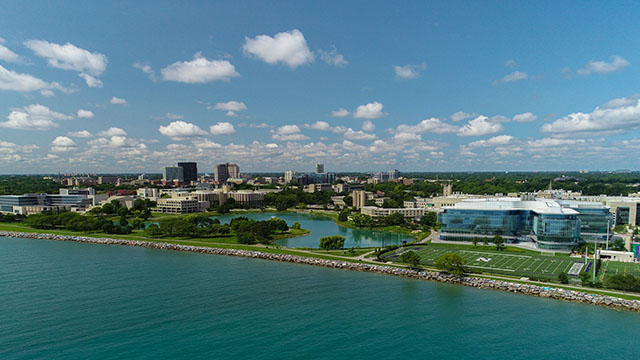As Northwestern prepares for a new step in its phased return to campus, the University is promoting safety and wellness amid the COVID-19 pandemic.
As we heard in a recent town hall, Evanston residents have many questions.
Northwestern Now reached out to Northwestern leaders and asked them to explain the University’s plans and expectations for Fall Quarter. Below is an edited series of questions and answers about testing protocols, expectations for students, faculty and staff — including the enforcement of rules — plans for dealing with positive cases and what campus will look like once the academic year begins in earnest later this month.
Why is it important that Northwestern return to campus amidst the pandemic?
As the world grapples with myriad challenges from COVID-19, Northwestern’s research and the contributions of its academic community are more critical than ever. In labs across campus, Northwestern researchers and scientists are working on the front lines to mitigate COVID-19.
For example, in the past few months, Northwestern scientists have uncovered a new vulnerability in the novel coronavirus, illuminating a potential treatment. In another project, researchers are using artificial intelligence to speed the search for treatments and vaccines. And a new wearable device developed at Northwestern is making it easier to catch warning signs and monitor patients as the illness progresses.
Northwestern serves as a cultural, social and economic anchor for the Evanston community. And our students, faculty and staff continue to play an essential role in strengthening Evanston neighborhoods by working with local schools to improve outcomes for K-12 students, supporting the small business community and helping the most vulnerable residents.
What are the plans for student move-in and orientation?
Move-in for graduate students was Sept. 1, and undergraduates began moving in Sept. 12. Traditional Wildcat Welcome orientation activities, including March Through the Arch, will be virtual this year.
To support healthy Northwestern and Evanston communities and to create an equitable way to adhere to Centers for Disease Control and Prevention and local travel quarantine guidance, Northwestern is beginning the academic year with a two-week Wildcat Wellness period during which all students will follow a modified quarantine, similar to the Illinois stay-at-home order issued in April.
How many people are expected to be on campus this fall?
The typical density of campus will be reduced significantly this fall as first- and second-year students will remain at home. Additionally, through alternative work arrangements, more than half of the staff will perform their jobs remotely on any given day, in accordance with Evanston’s health and safety guidelines. Third- and fourth-year students, as well as graduate students, will still be able to come to campus.
How will the University hold classes?
Northwestern will offer fall classes in three modes: fully remote, face-to-face or a hybrid combination of the two. In very rare cases, face-to-face classes and other experiences will be held when they are essential for students’ academic progress. Such cases might include hands-on work in a science lab or in-person instruction for music students.
What are the University’s expectations for safe behavior?
As our new campus campaign demonstrates, “We’re N This Together.” Northwestern expects that everyone will wear a mask, wash their hands, maintain physical distance and monitor their personal health.
These are the core responsibilities that underpin the return to campus policy and they will be required by everyone, in classrooms, labs, common spaces and especially in the surrounding community as we know that some neighbors are at high risk.
How will Northwestern handle student healthcare?
Student health and well-being remain the University’s top priority, and a number of changes have been made this year to ensure the best possible service. Northwestern Medicine (NM) will manage and oversee clinical operations of the Northwestern University Health Service, which handles more than 30,000 annual visits from students on both the Evanston and Chicago campuses.
NM will support students returning to campus and provide on-site COVID-19 testing for students, faculty and staff as well as support the University’s contact tracing, quarantine and case management processes. NM also will act as a medical advisor to University leadership in navigating the pandemic.
Counseling and Psychological Services (CAPS) also has made changes due to the pandemic. CAPS staff are now working remotely, telehealth (support gatherings, workshops and phone consultations) has been added and outreach programming has been expanded to include virtual workshops and gathering spaces, as well as more online resources and self-help tools.
Will there be COVID-19 testing?
Yes. Northwestern has implemented a three-step COVID-19 testing process for undergraduate students returning to campus:
- Pre-arrival: An at-home mail-in test that students must take prior to their arrival on campus.
- Arrival: Testing at on-campus facility upon arrival to kick off the Wildcat Wellness period.
- Ongoing: Both on- and off-campus students will be tested regularly throughout their time on the Evanston campus this year.
Testing for graduate students will be available by appointment. The University also will conduct periodic testing on campus for faculty and staff throughout Fall Quarter.
If Northwestern community members experience COVID-19 symptoms, will they be monitored regularly?
Yes. Students, faculty, staff and guests visiting either the Evanston or Chicago campuses will be required to report symptoms daily, currently using a web-based survey. All coming to campus will be required to use the Symptom Tracker app each day before physically arriving on campus and show a virtual “green badge” (for students, faculty and staff) or a virtual “purple badge” (for visitors) when prompted on campus. Users identified as having COVID-19 symptoms will be issued a virtual “red badge” and given instructions on how to proceed.
How will the University respond to positive cases?
When a member of Northwestern’s on-campus community tests positive for COVID-19, the University responds in a variety of ways, including contact tracing and enhanced cleaning.
Anyone testing positive for COVID-19 must self-isolate, and anyone identified via contact tracing will be asked to quarantine until the recommended CDC clearance timeframe has been met. Northwestern will also update its Confirmed Case Tracker on a weekly basis.
How can someone report a concern about a Northwestern community member’s behavior or protocol violations?
When Northwestern receives information about a potential violation, University officials will respond accordingly. Isolated low-level concerns will result in a notification and education to reinforce our community expectations. Repeated low-level concerns will lead to an escalated response. Northwestern staff will work in partnership with the City to educate and reinforce community expectations.
Severe incidents that put our community’s safety at risk, such as hosting a large event on or off campus without social distancing, will cause swift and significant action. Credible reports of actions that endanger the health and safety of our community will result in interim actions, such as restriction from campus. And for students, the most severe cases may result in suspension or expulsion once the case has been fully resolved.
Contact the University if you see a potential violation of student expectations or the COVID-19 Student Code of Conduct. To report an issue, use NUhelp: Community Concerns Report. Please include details, addresses and photos if you have them.


